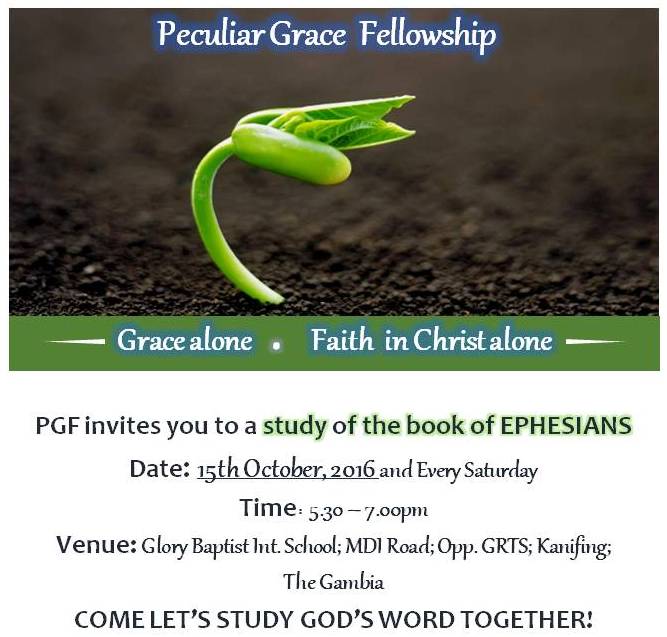
“Inasmuch as many have undertaken to compile a narrative of the things that have been accomplished among us, it seemed good to me also, having followed all things closely for some time past, to write an orderly account for you, most excellent Theophilus, that you may have certainty concerning the things you have been taught.” Luke 1:1, 3-4.
Isn’t it striking that certainty in the things noble Theophilus had been taught was to be derived from a study of the things written about Jesus?
Wasn’t what he heard at conversion sufficient to establish him in his faith journey? Our text teaches otherwise. Whilst faith comes by hearing the Word of God (Romans 10:17), perfection in righteousness and growth is to be derived from our daily engagement with Scripture.
The second question of the Westminster Shorter Catechism says this about the Word of God:
“The Word of God, which is contained in the Scriptures of the Old and New Testaments, is the only rule to direct us how we may glorify and enjoy him.”
Rightly so, our enjoyment of God is tied to our knowledge of the Scriptures, for in it we come face to face with its glorious author – God himself. To this end, Matthew Henry prayed:
“Oh that we may love our Bibles more, and keep closer to them! then shall we find benefit, and at last gain the happiness therein promised by faith in our Lord Jesus Christ, who is the main subject of both Testaments.” 1
Luke felt it necessary to present an orderly account of the doctrine of Christ, having carefully investigated all things from their source (v.3). Ours is a faith that can be stated in propositions. It is not amorphous or ambiguous, left to our own definitions or individual speculations. Countless times in the New Testament, we hear admonitions to ‘contend for the faith’ (Jude 1:3), ‘give the reason for the hope we have’ (1 Peter 3:15), and ‘guard the good deposit’ (1 Timothy 6:20; 2 Timothy 2:2) etc.; all of which point to the fact that the content of the Christian faith can be defined and has been preserved and carefully passed down from generation to generation. Books like Luke, and others in the Biblical canon, have therefore been written to give us certainty concerning the things we believe as Christians.
The Bible attests of itself:
“All Scripture is breathed out by God and profitable for teaching, for reproof, for correction, and for training in righteousness, that the man of God may be complete, equipped for every good work.” 2 Timothy 3:16.
How many Christians deprive themselves of the spiritual food they need to establish themselves in the faith, grow and blossom and be equipped for service to their Lord through a neglect of the discipline of Bible intake?
The Word is the instrument of our sanctification. Our Lord prayed, “Sanctify them in the truth; your word is truth.” (John 17:17). Through it, we are made complete, meaning lacking nothing that is profitable to the Christian life. All that we need to live a wholly pleasing life to God is embedded in the Scriptures. As one commentator says,
“There is no deficiency in the Bible for man, in any of the situations in which he may be placed in life; and the whole tendency of the book is to make him who will put himself fairly under its instructions, absolutely perfect.” 2
Most instructive is that Luke wanted Theophilus to be assured of what he had been taught. Isn’t this why our Father has graciously preserved the Scriptures for our use?
God knows there will be doubts that threaten our faith in Him. He forewarned that the gates of hell would try to prevail against his church (Matthew 16:18), and there will be times when persecutions and trials would threaten to undo us. And so, he left us the Scriptures to assure us that nothing can separate us from His love (Romans 8:35-39). In it, As Spurgeon says, is a balm for every wound, a salve for every sore.” 3
Oh, that we would be diligent to study [the Bible] to show ourselves approved as workmen who need not be ashamed, but rightly handling the word of truth (2 Timothy 2:15).
“How precious is the book divine,
By, inspiration given!
Bright as a lamp its doctrines shine.
To guide our souls to heaven.
It sweetly cheers our drooping hearts.
In this dark vale of tears:
Life, light, and joy, it still imparts,
And quells our rising fears.
This lamp, through all the tedious night.
Of life, shall guide our way;
Till we behold the clearer light.
Of an eternal day.” 4
Notes
1. Matthew Henry’s Concise Commentary. Henry is commenting on 2 Timothy 3:14-17. Available from https://biblehub.com/commentaries/2_timothy/3-17.htm. Accessed 25 February 2023.
2. Barnes’ Notes on the Bible, Commenting on 2 Timothy 3:16-17. Available from https://biblehub.com/commentaries/2_timothy/3-17.htm. Accessed 25 February 2023.
3. Charles H. Spurgeon, in “Feeding Sheep or Amusing Goats?” Available from https://www.sermonindex.net/modules/newbb/viewtopic.php?topic_id=5950&forum=40. Accessed 25 February 2023.
4. Barnes’ Notes on the Bible, Commenting on 2 Timothy 3:16-17. Available from https://biblehub.com/commentaries/2_timothy/3-17.htm. Accessed 25 February 2023.



That your word lightened my heart to desire you more🙏🏿
Amen!
Amen 🙏🏾